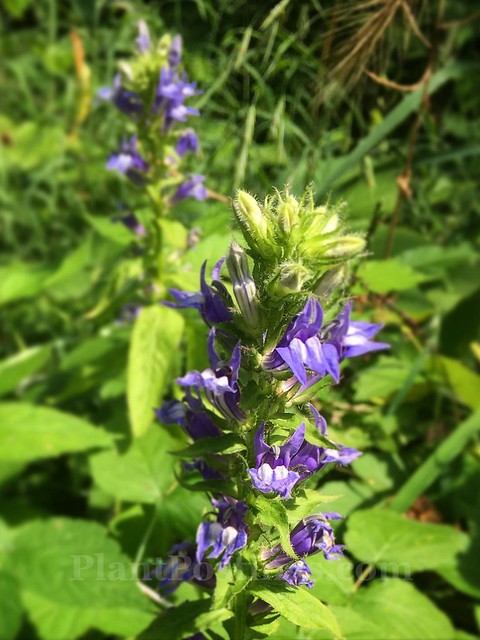 |
| Great Blue Lobelia (Lobelia siphilitica), one of several plants I'll try to grow from seed for next year's garden. |
In this season of senescence, I've made a decision about one of the garden plots on our property. It's an area where the wild woods meet the cultivated garden beds. It's an island and focal point in the middle of the backyard. It's filled with an evergreen ground cover of Pachysandra (P. terminalis). It offers dappled sun/shade to plants throughout the day.
And it's infested with rabbits.

Wild Bergamot (Monarda fistulosa) is a new addition to this part of the garden. It grows fine here, but the rabbits ate most of it. I scattered seeds from the few flowers that survived. Stay tuned.
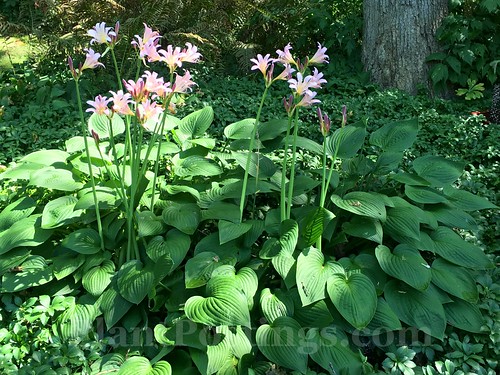
When summer starts to wind down, the Surprise Lilies (Lycoris squamigera) pop up through skirts of hosta foliage. Rabbits never seem to eat Lycoris.
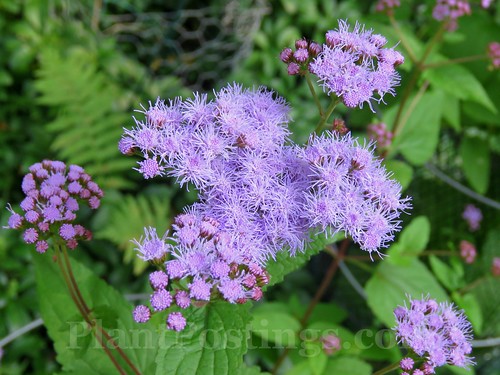
And as summer turns to autumn, Blue Mistflower (Conoclinium coelestinum) adds pops of violet to the area. Of course, the rabbits eat this plant voraciously, so it, too, must be caged. The fortunate thing about this plant is that it propagates easily from seed.
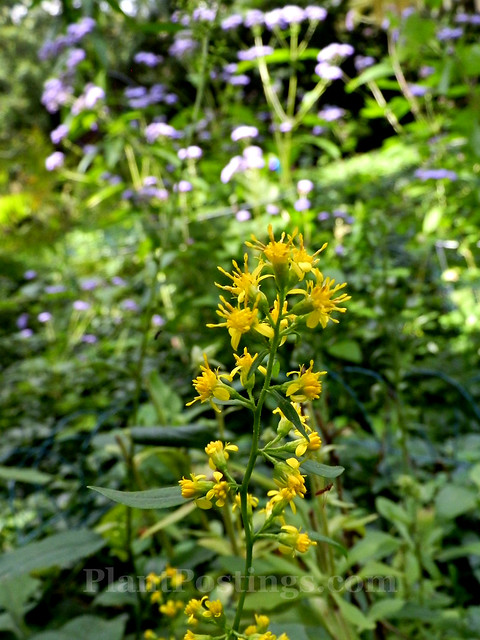
ZigZag Goldenrod (Solidago flexicaulis), another rabbit favorite, has somehow found a way to survive by a thread.
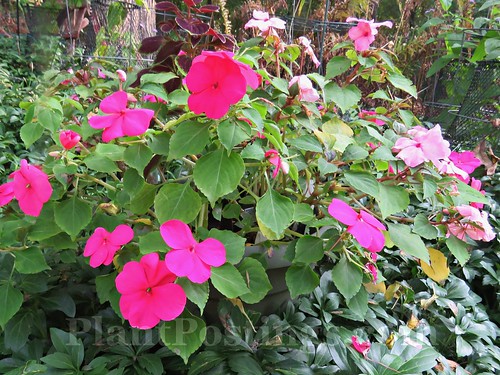
For example, I added two pots of Impatiens and Coleus. You can barely see the green pots amid the Pachysandra. I'm planning to use more pots (and hopefully fewer rabbit-repelling caging devices) in the garden next summer.

I say this because I've spent too much time and money trying to get plants started in this part of the garden. The list of consumed/destroyed plants, gallons of rabbit repellent, and rabbit stories is too long to include here. So, let's just say it's time to surrender.
First of all, I'm not unhappy with the basic framework of this garden area.

The ferns are lush and lovely in the late spring and early summer.

Especially when joined by the giant Alliums in late May through early July.

In mid-summer, Swamp Milkweed (Asclepias incarnata) has shown promise here, too, although the past couple of years have been marginal for this plant in this particular spot.

This graceful, towering native plant, Bugbane (Actaea racemosa), will always have a summer place here. Rabbits don't touch it.
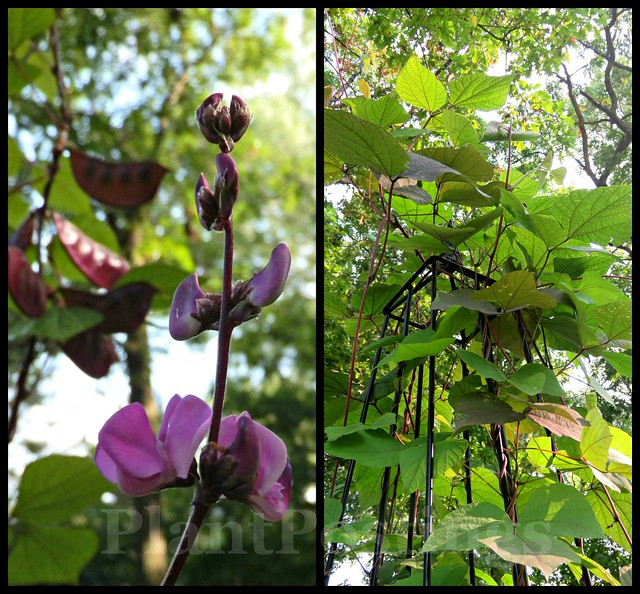
Hyacinth Bean vine (Lablab purpureus) is happy here, too, growing in a pot protected from rabbits with caging at the bottom, and growing up an obelisk.

The ferns are lush and lovely in the late spring and early summer.

Especially when joined by the giant Alliums in late May through early July.

In mid-summer, Swamp Milkweed (Asclepias incarnata) has shown promise here, too, although the past couple of years have been marginal for this plant in this particular spot.

This graceful, towering native plant, Bugbane (Actaea racemosa), will always have a summer place here. Rabbits don't touch it.

Hyacinth Bean vine (Lablab purpureus) is happy here, too, growing in a pot protected from rabbits with caging at the bottom, and growing up an obelisk.

Wild Bergamot (Monarda fistulosa) is a new addition to this part of the garden. It grows fine here, but the rabbits ate most of it. I scattered seeds from the few flowers that survived. Stay tuned.

When summer starts to wind down, the Surprise Lilies (Lycoris squamigera) pop up through skirts of hosta foliage. Rabbits never seem to eat Lycoris.

And as summer turns to autumn, Blue Mistflower (Conoclinium coelestinum) adds pops of violet to the area. Of course, the rabbits eat this plant voraciously, so it, too, must be caged. The fortunate thing about this plant is that it propagates easily from seed.

ZigZag Goldenrod (Solidago flexicaulis), another rabbit favorite, has somehow found a way to survive by a thread.
My point? From now on, I will only plant species in this part of the garden that I know repel rabbits, already exist in my garden and can be transplanted, or can be grown in pots. No more investments in plants. Even the ones that rabbits supposedly don't eat often get munched to the ground. I want more color in the middle of summer, and I'm pleased with a few things that happened this year--things I'll repeat and expand on next year.

For example, I added two pots of Impatiens and Coleus. You can barely see the green pots amid the Pachysandra. I'm planning to use more pots (and hopefully fewer rabbit-repelling caging devices) in the garden next summer.

A few new decorative items are adding color midseason, too. I really like this new glass birdbath, and I added a solar-powered fountain to it for more visual interest. Next year, the potted annual plant colors will complement it better.
I'm taking a chance with one new plant--several plugs of Golden Groundsel (Packera aurea). Everything I read about this plant says it forms dense colonies and is mammal-resistant. We'll see.
In late fall, I'll also be scattering seeds of several native plants for partial sun or shade--plants that rabbits generally don't eat, including:
Flowering spurge (Euphorbia corollata)
Dutchmen's Breeches (Dicentra cucullaria)Downy Wood Mint (Blephilia ciliata)Midland Shooting Star (Dodecatheon meadia)Great Blue Lobelia (L. siphilitica)Hoary Skullcap (Scutellaria incana)
Seeds are less expensive than plants and can cover a wider area. The investment in time, effort, and expectations won't be as great.
I've surrendered to seeds.
Your list of plants do sound good. I hope you get the expected results. The Lobelia I had in the garden this year. It wasn't munched on by rabbits. I wish you the best of luck. It is so disheartening when rabbits etc eat the plants or dig them up. Squirrels and chipmunks are horrible diggers. They destroy my pots. I am about ready to give up on them. I have to put chicken wire around them all. Very frustrating.
ReplyDeleteThanks, Lisa. I have issues with chipmunks and squirrels, too. The rabbits bother me more, though, but, yes, they're all frustrating!
DeleteI've had only minimal experience with rabbits but even that made it clear to me how quickly they can make plants entirely disappear. In our case, the resident coyotes largely eliminate rabbit problems during the spring months, leaving us rabbit-free until the following spring. But coyotes create other issues - and I doubt the postal service would allow me to send your one! - so seeds are probably a much better strategy.
ReplyDeleteYes, send me some coyotes! We do occasionally have them here, even in the suburbs and the city, but not enough to take care of the rabbit overpopulation. Hawks and owls help, too, but as the neighborhood becomes more and more developed, it seems the natural predators are disappearing. But, we'll always find new ways to work around... Onward! :)
DeleteHi Beth! Based on what is seen in your pictures, this is a very nice part of your garden! I do like green masses of foliage punctuated by splashes of color. You have some of my favorites here - alliums, bugbane, milkweed. I don't want to say anything about bunnies... It's a painful subject for me! I feel your frustration!
ReplyDeleteAnyway, I hope those seeds will produce lovely blooms next year!
Have a nice fall!
Hi Tatyana! Thank you. Very occasionally I have a soft spot in my heart for the rabbits, especially the babies. But then they eat my plants to the ground and that tolerance disappears. So, I will continue to try more seeds and add more pots.
DeleteAn honourable surrender and a definite win win, it looks fabulous. Love the actaea, I must try it in my own rabbit infested patch!
ReplyDeleteThank you. The Actaea is great, and it towers over my garden in mid- to late summer. There are several species and cultivars, too. It's a nice, reliable anchor for the garden.
DeleteYour back garden looks lovely, and definitely staying with the rabbit-averse natives sounds like a good plan.
ReplyDeleteThanks, Lisa. I will be curious to see if any of the seeds take, and if they do, if the rabbits will avoid the plants. It's a fun experiment, anyway. ;-)
DeleteYour garden looks fabulous...sorry that the rabbits are so bad. I think seeds are a smart decision. xo
ReplyDeleteThanks, Gail. It's worth a try. ;-)
DeleteDutchmen's Breeches (Dicentra cucullaria) are one of my husbands favorites. :-)
ReplyDeleteI like your plans and I think it will be lovely.
I need to plant some Alliums, seeing your photos reminds me to do so. ;-)
I can't say enough good things about the Alliums. I've had more luck with the spring to early July blooming Alliums because of the shade here. But if you have a sunny patch, there are some great late-blooming Alliums, too, such as 'Summer Beauty,' 'Millenium,' and for fall, 'Ozawa.'
DeleteThis area of your garden is gorgeous, despite the rabbit depredations. I think your new approach is very wise, and you will be happy with the results.
ReplyDeleteThanks, Jason. I like it, too. There are fewer plants there than when we moved in because the rabbit population has increased with lack of predators. Even with my additions, the plants just don't survive. But I'm learning to live with it and try a more hands-off approach. ;-)
DeleteBeautiful blooms.Loved those wildly growing Ferns . It would be my pleasure if you join my link up party related to gardening http://jaipurgardening.blogspot.com/2020/09/garden-affair-flowering-aquatic-plants.html
ReplyDeleteThank you. I'll check it out. :)
Delete